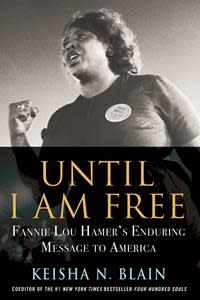National Civil Rights Museum virtually presents new book Until I Am Free
Author Keisha Blain discusses new book on Fannie Lou Hamer with moderator Donna Brazile

Author Dr. Keisha N. Blain decided on her book's title from a statement Fannie Lou Hamer frequently repeated as she spoke to audiences across the nation during the 1960s and 1970s: “Until I am free, you are not free either.”
Memphis, TN, Sept. 28, 2021 (GLOBE NEWSWIRE) -- The National Civil Rights Museum brings New York Times bestselling author Dr. Keisha N. Blain’s, Until I Am Free: Fannie Lou Hamer’s Enduring Message to America to its Book and Author Series on Wednesday, October 6. Set to release on October 5, the book is a highly anticipated blend of biography and social commentary on the civil rights activist’s seminal moments.
In Until I Am Free, Blain shines a light on Hamer’s life, ideas, and political strategies, situating her as a key political thinker of the Civil Rights Movement alongside Martin Luther King Jr., Malcolm X, John Lewis, and Rosa Parks. Blain draws extensively on Hamer’s own words, bringing to life this working-poor, Black woman activist who refused to be sidelined, intimidated, or to settle for anything less than full justice.
In rural Mississippi in 1962, at the age of 44 and with just a 6th-grade education, Fannie Lou Hamer had a political awakening and became a life-long activist. Having been the victim of forced sterilization the year before, she began fighting relentlessly for voting rights for Black Americans and against white supremacy, surviving brutal beatings by police and private citizens, as well being shot at in a near fatal attempt on her life. From Hamer’s later-in-life start in activism to the violence inflicted upon her by white supremacists to her rousing speech at the 1964 Democratic Convention, consistent was her boldness and radical honesty, and her insistence that social justice must come from the bottom up—a position often at odds with the hierarchical leadership within the Civil Rights Movement of the day.
“Fannie Lou Hamer is an icon of the Civil Rights Movement,” said Dr. Noelle Trent, the museum’s Director of Interpretation, Collections and Education. “Dr. Blain’s work offers a stunning in-depth look at Hamer’s work and strategy, placing Hamer as a crucial strategic mind in the Mississippi Freedom Movement. We are honored to host the launch of this stellar work.”
It’s been more than 40 years since Fannie Lou Hamer’s death in 1977, but her words still speak truth to power. Hamer’s life and tireless efforts show how we might continue the fight for the country’s still unrealized ideals and against its police violence, voter suppression, and economic inequality.
“When we do not discuss grassroots activists like Fannie Lou Hamer, we distort our history beyond recognition and make it that much harder for future generations to learn from the past,” said Blain. “When we only focus on a handful of well-known figures such as Martin Luther King Jr., Rosa Parks, and Malcolm X, we miss the many ways ordinary men and women fought to bring about change on the local level—within their communities and within their own spheres of influence. This is crucial for all Americans to know because it makes it extraordinarily clear that ordinary people, including those with limited formal education and few material resources, can in fact play a significant role in shaping American society.”
Dr. Keisha N. Blain is an award-winning historian of the 20th century United States with broad interests and specializations in African American History, the modern African Diaspora, and Women’s and Gender Studies. She completed a PhD in History from Princeton University. She is an Associate Professor of History at the University of Pittsburgh and the president of the African American Intellectual History Society. She is also a columnist for MSNBC, covering race, gender, and politics in historical and contemporary perspectives. She is currently a 2020-2021 fellow at the Carr Center for Human Rights Policy at Harvard University and a member of the School of Social Science at the Institute for Advanced Study.
The October 6 book talk event is moderated by journalist, political strategist, and media commentator Donna Brazile. The event is hosted in partnership with the Brennan Center for Justice at the New York University School of Law, an independent, nonpartisan law and policy research organization.
An autographed copy of Until I Am Free is available for purchase in the museum’s online store. The Book & Author Series virtual event is at 6:00pm Central and is free and open to those who register online. For more information, visit civilrightsmuseum.org.
Attachment
CONTACT: Connie Dyson National Civil Rights Museum 9013315460 cdyson@civilrightsmuseum.org


 Yahoo Finance
Yahoo Finance 